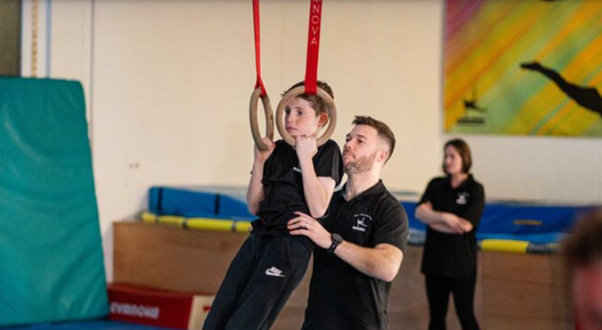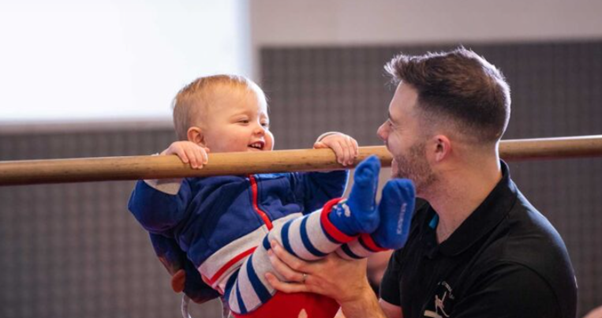As excitement builds towards the next Commonwealth Games, Welsh Gymnastics continues to celebrate the theme of Coach Legacy, honouring those who have transformed their competitive experiences into lasting impact beyond the podium. Among them is Nathan Mullett, whose journey from international gymnast to dedicated coach reflects the heart of what legacy truly means. After representing Wales at the 2004 Commonwealth Youth Games in Australia, Nathan’s career was unexpectedly cut short through injury, but his passion for gymnastics never faded. Instead, it evolved into a new mission: to inspire, teach, and guide the next generation of gymnasts to discover the same love for the sport that shaped his own life.
Nathan’s first major international competition was the 2004 Commonwealth Youth Games in Bendigo. It was his first experience in a multisport environment and being “part of an athlete’s village and surrounded by athletes from all over the world, all striving to be the top in their respected sports” gave him a new perspective on competition. Representing Wales alongside athletes from other sports brought a deep sense of pride, which Nathan remembers vividly: “I had represented Wales before but being with other Welsh athletes from different sports, competing for Wales really meant something in this environment.”
That sense of pride carried into his performance. Nathan had been working on a challenging high bar skill, and in Bendigo, it finally came together. “I made the high bar final and competed the new release successfully, for the first time in competition, and the feeling of pride played a role in this. I wasn’t just doing it for me, I was doing it for Wales,” he recalls. Beyond medals and routines, Nathan learned lessons about discipline, resilience, and the value of consistent effort. “Being surrounded by hard working, disciplined athletes at the top of their sports inspired me and reaffirmed the mentality that whilst luck and talent have a part to play, ultimately it’s hard work and discipline that gets results.”
His competitive journey was abruptly interrupted in 2010, when injuries to his knee and shoulder forced him to withdraw from the Commonwealth Games in Delhi. Having trained 30 hours a week since childhood, stopping felt like losing a part of his identity. Nathan reflects, “From the age of 6, gymnastics was a huge part of my life… when I stopped I felt like I was losing a part of my identity and my purpose.”
During this period, he began helping out in local gymnastics clubs while studying at Cardiff University. Starting with grassroots classes and younger gymnasts, Nathan discovered a passion for teaching that surprised him: “I was helping out with the grass roots section and I instantly fell in love with it, which surprised me.” Coaching gave him a new focus. The sense of achievement he once gained from perfecting his own skills shifted to seeing others grow and succeed. He encourages his gymnasts to embrace mistakes as part of the learning process, teaching them to “fail correctly” so they understand that errors are opportunities to improve.


Nathan is honest about the challenges of coaching. Progress isn’t always in his control, and balancing multiple gymnasts can be demanding, but he emphasises that passion makes the effort worthwhile: “Coaching is hard – sometimes it feels like a gymnast’s progression is out of your hands and you’re not only focused on yourself but multiple gymnasts. However, I firmly believe that if you’re doing something you love, it doesn’t feel like work.”
He also discovered that teaching the fundamentals of gymnastics can be just as rewarding as high-level coaching. “I thought I’d only take satisfaction from teaching performance gymnastics, however I was really surprised by how much I enjoyed teaching preschool and the grass roots side of the sport,” he says, noting that helping beginners fall in love with the sport can be just as fulfilling as training performance athletes.
Nathan credits early access to coaching and judging courses for helping him transition smoothly from athlete to coach. “Getting the opportunity as a gymnast to do my Level 2 coaching course and a judging course really sped up my transition from gymnast to coach. So being able to provide this opportunity to some of the older gymnasts will give them their first experience of coaching and may well encourage more of them to consider a career in coaching in the future,” he explains.
For Nathan, the journey from athlete to coach has been about more than technique, it’s about keeping the love of gymnastics alive and inspiring others. “Going from gymnastics being your life and suddenly having all this time and feeling a sense of a loss, coaching enables you to continue the gymnastics journey, just because you are unable to compete yourself, it doesn’t have to end there,” he says. His story is a powerful example of Coach Legacy in action: demonstrating that the lessons, passion, and influence of one athlete can continue to shape the sport for years to come.
Feeling inspired? Start your coaching journey today through our coaching courses.